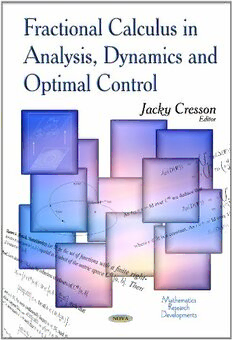
Fractional Calculus in Analysis, Dynamics and Optimal Control PDF
Preview Fractional Calculus in Analysis, Dynamics and Optimal Control
MATHEMATICS RESEARCH DEVELOPMENTS F C A , RACTIONAL ALCULUS IN NALYSIS DYNAMICS AND OPTIMAL CONTROL No part of this digital document may be reproduced, stored in a retrieval system or transmitted in any form or by any means. The publisher has taken reasonable care in the preparation of this digital document, but makes no expressed or implied warranty of any kind and assumes no responsibility for any errors or omissions. No liability is assumed for incidental or consequential damages in connection with or arising out of information contained herein. This digital document is sold with the clear understanding that the publisher is not engaged in rendering legal, medical or any other professional services. M R D ATHEMATICS ESEARCH EVELOPMENTS Additional books in this series can be found on Nova’s website under the Series tab. Additional e-books in this series can be found on Nova’s website under the e-book tab. MATHEMATICS RESEARCH DEVELOPMENTS F C A , RACTIONAL ALCULUS IN NALYSIS DYNAMICS AND OPTIMAL CONTROL JACKY CRESSON EDITOR New York Copyright © 2014 by Nova Science Publishers, Inc. All rights reserved. No part of this book may be reproduced, stored in a retrieval system or transmitted in any form or by any means: electronic, electrostatic, magnetic, tape, mechanical photocopying, recording or otherwise without the written permission of the Publisher. For permission to use material from this book please contact us: Telephone 631-231-7269; Fax 631-231-8175 Web Site: http://www.novapublishers.com NOTICE TO THE READER The Publisher has taken reasonable care in the preparation of this book, but makes no expressed or implied warranty of any kind and assumes no responsibility for any errors or omissions. No liability is assumed for incidental or consequential damages in connection with or arising out of information contained in this book. The Publisher shall not be liable for any special, consequential, or exemplary damages resulting, in whole or in part, from the readers’ use of, or reliance upon, this material. Any parts of this book based on government reports are so indicated and copyright is claimed for those parts to the extent applicable to compilations of such works. Independent verification should be sought for any data, advice or recommendations contained in this book. In addition, no responsibility is assumed by the publisher for any injury and/or damage to persons or property arising from any methods, products, instructions, ideas or otherwise contained in this publication. This publication is designed to provide accurate and authoritative information with regard to the subject matter covered herein. It is sold with the clear understanding that the Publisher is not engaged in rendering legal or any other professional services. If legal or any other expert assistance is required, the services of a competent person should be sought. FROM A DECLARATION OF PARTICIPANTS JOINTLY ADOPTED BY A COMMITTEE OF THE AMERICAN BAR ASSOCIATION AND A COMMITTEE OF PUBLISHERS. Additional color graphics may be available in the e-book version of this book. LIBRARY OF CONGRESS CATALOGING-IN-PUBLICATION DATA Fractional calculus in analysis, dynamics, and optimal control / editor, Jacky Cresson (Laboratory of Applied Mathematics, University of Pau, Pau Cedex, France). pages cm Includes index. ISBN: (cid:28)(cid:26)(cid:27)(cid:16)(cid:20)(cid:16)(cid:25)(cid:21)(cid:28)(cid:23)(cid:27)(cid:16)(cid:25)(cid:24)(cid:28)(cid:16)(cid:27) (eBook) 1. Fractional calculus. I. Cresson, Jacky, editor of compilation. QA314.C74 2014 515'.83--dc23 2013043481 Published by Nova Science Publishers, Inc. † New York CONTENTS Preface vii Chapter 1 Local Fractional Derivatives 1 N. C. Dias and J. N. Prata Chapter 2 Fractional Variational Embedding and Lagrangian Formulations 65 of Dissipative Partial Differential Equations Jacky Cresson Chapter 3 A Class of Fractional Optimal Control Problems and Fractional 127 Pontryagin's Systems. Variational Integrator and Existence of Continuous/Discrete Noether's Theorems Loïc Bourdin Chapter 4 Fractal Traps and Fractional Dynamics 179 Pierre Inizan Chapter 5 Numerical Approximations to Fractional Problems 201 of the Calculus of Variations and Optimal Control Shakoor Pooseh, Ricardo Almeida and Delfim F. M. Torres Index 241 P REFACE Fractionalcalculushasreceivedabigdealofattentioninrecentyearsduetoitsabilityto capturemanyparticularfeaturesofPhysics,BiologyorEconomy. ManyTextbooksonthe subjectaredevotedtothetheoryoffractionalcalculusordealwithspecificapplicationsin differentfields. Mathematicalmonographsaboutthesubjectaremostofthetimededicated tofractionalversionsof classicalmathematical fieldslikefractionaldifferentialequations, fractional partial differential equations or fractional calculus of variations, etc. However, thefractionalversionofmanyproblemsisnotalwayssupportedbyanymathematicalcon- siderationapart from the generalization of known results. As a consequence, most of the resultsinthesemonographscannotbeusedtosolveclassicalproblemsofmathematicsand areofinterestonlyforpeopleworkingwithfractionalcalculus. Anon exhaustivelistof classicalmathematical domainswhere fractionalcalculuscan beusedtoobtainnewresultsis: • DynamicalsystemsandinparticularchaoticHamiltoniansystems • Analysisofnondifferentiablefunctions • VariationalformulationsofPDEsorODEs None of the previous fields is defined by or concerned with fractional calculus at the beginning. The first item was developed by Georges Zaslavsky and Rudolph Hilfer at the begin- ning of the 1990. We can find a synthese of Zaslavsky’s work in his book Hamiltonian Chaosandfractionaldynamics(OxfordUniversityPress, 2005). Werefer tothearticleR. Hilfer untitledFoundationoffractionaldynamics(Fractals 3(3),549-556,1995)for a good introductiontohispointofview. Despitesomeprogress,thetoolsandrigorousfoundations offractionaldynamicstostudyHamiltonianchaosarefarfrombeingsatisfying. The two others items have appeared after the work of K. Kolvankar and A.D. Gan- gal around1997about the localfractional calculusand itsrelation toanalysisof irregular curves(seeK.KolwankarandA.D.Gangal,Hlderexponentsofirregularsignalsandlocal fractionalderivatives,Pramana J.phys. 48,No. 1(1997),4968)andin1996afterthesem- inal workof Fred Riewe about a fractionalLagrangian framework for dissipativesystems viii JackyCresson (see F. Riewe, NonconservativeLagrangianandHailtonianmechanics, Phys. Rev. E (3), 53(2),1890-1899,1996). The aim of this book is to provide examples where fractional calculus can be used to solveclassicalproblemsofanalysisoratleasttoprovideanewpointofviewandtopresent newresultsinthetheoryoffractionaloptimalcontrol. Allthecontributionsareselfcontain andalltheproofsaregivenindetails. Thecontentofthisbookisasfollows: The first Chapter authoredby Da Prata and Pintodealswith analysisand geometry of non differentiable functionsusing the so-called local fractional derivative. The author re- viewedtheinitialnotiondefinedbyK.KolvankarandA.D.Gangallandthedefinitiongiven by F. Ben Adda and J. Cresson. They provide a full comparison of these twonotionsand they relate preciselythe order of differentiationtothe fractal dimensionof the underlying curveaswellasitsHo¨lderregularity. Theyalsoextendthenotionoflocaldifferentiation. ThesecondChapterauthoredbyCressonreviewsrecentworksontheuseofafractional calculusofvariationstofindLagrangianvariationalformulationsfordissipativePDEs. This Chapteralsogivesacompleteintroductiontotheformalismofembeddingwhichisusedto obtaintheseresults. ThethirdChapter authoredby Bourdinstudiesthediscrete/continuousfractionalopti- malcontrolbyprovinginparticularafractionalPontryagin’stheorem. The fourth Chapter authored by Pierre Inizan deals with an abstract model associated tochaoticHamiltoniansystemsallowingtoprovetheemergenceoffractionaldynamicsfor the asymptoticdynamical behaviour of the systems in the neighbourhoodof fractal traps. TheconstructionusesacombinationofG.ZaslavskyandR.Hilferideas. ThelastChapterauthoredbyPoosed,AlmeidaandTorresdealsmorespecificallywith numericalsimulationoffractionaloptimalcontrolproblem. AlltheChapterscontainmanyexamplesaswellasnumericalsimulations. Wehopethatthereaderwillfindinthisbookmanyreasonstostudyfractionalcalculus aswellasnewideasanddirections. 2March2013 JackyCresson LaboratoryofAppliedMathematics UniversityofPauAvenueUniversity P.O.Box1155 64013PauCedex,France [email protected]
